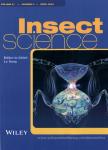Fitness and physiology of Adelges tsugae (Hemiptera: Adelgidae) in relation to the health of the eastern hemlock
Fitness and physiology of Adelges tsugae (Hemiptera: Adelgidae) in relation to the health of the eastern hemlock作者机构:Department of Entomology Pennsylvania State University PA 16801 Department of Entomology Virginia Tech Blacksburg VA 24061 USDA Forest Service Asheville NC 28804-3454 USA
出 版 物:《Insect Science》 (昆虫科学(英文版))
年 卷 期:2016年第23卷第6期
页 面:843-853页
核心收录:
学科分类:090502[农学-动物营养与饲料科学] 0905[农学-畜牧学] 09[农学] 0904[农学-植物保护]
基 金:United States Forest Service Virginia Polytechnic Institute and State University, VT University of Virginia, UV, (07-CA-11420004-161)
主 题:Adelges tsugae carbohydrates fecundity nitrogen tree health Tsuga canadensis
摘 要:The hemlock woolly adelgid, Adelges tsugae Annand is an invasive insect that frequently causes hemlock (Tsuga spp.) mortality in the eastern United States. Studies have shown that once healthy hemlocks become infested by the adelgid, nutrients are depleted from the tree, leading to both tree decline and a reduction of the adelgid population. Since A. tsugae is dependent on hemlock for nutrients, feeding on trees in poor health may affect the ability of the insect to obtain necessary nutrients and may consequently affect their physiological and population health. Trees were categorized as lightly or moderately impacted by A. tsugae based on quantitative and qualitative tree health measurements. Population health ofA. tsugae on each tree was determined by measuring insect density and peak mean fecundity; A. tsugae physiological health was determined by measuring insect biomass, total carbon, carbohydrate, total nitrogen, and amino nitrogen levels. Adelges tsugae from moderately impacted trees exhibited significantly greater fecundity than from lightly impacted trees. However, A. tsugae from lightly impacted hemlocks contained significantly greater levels of carbohydrates, total nitrogen, and amino nitrogen. While the results of the physiological analysis generally support our hypothesis that A. tsugae on lightly impacted trees are healthier than those on moderately impacted trees, this was not reflected in the population health measurements. Adelges tsugae egg health in response to tree health should be verified. This study provides the first examination of A. tsugae physiological health in relation to standard A. tsugae population health measures on hemlocks of different health levels.



